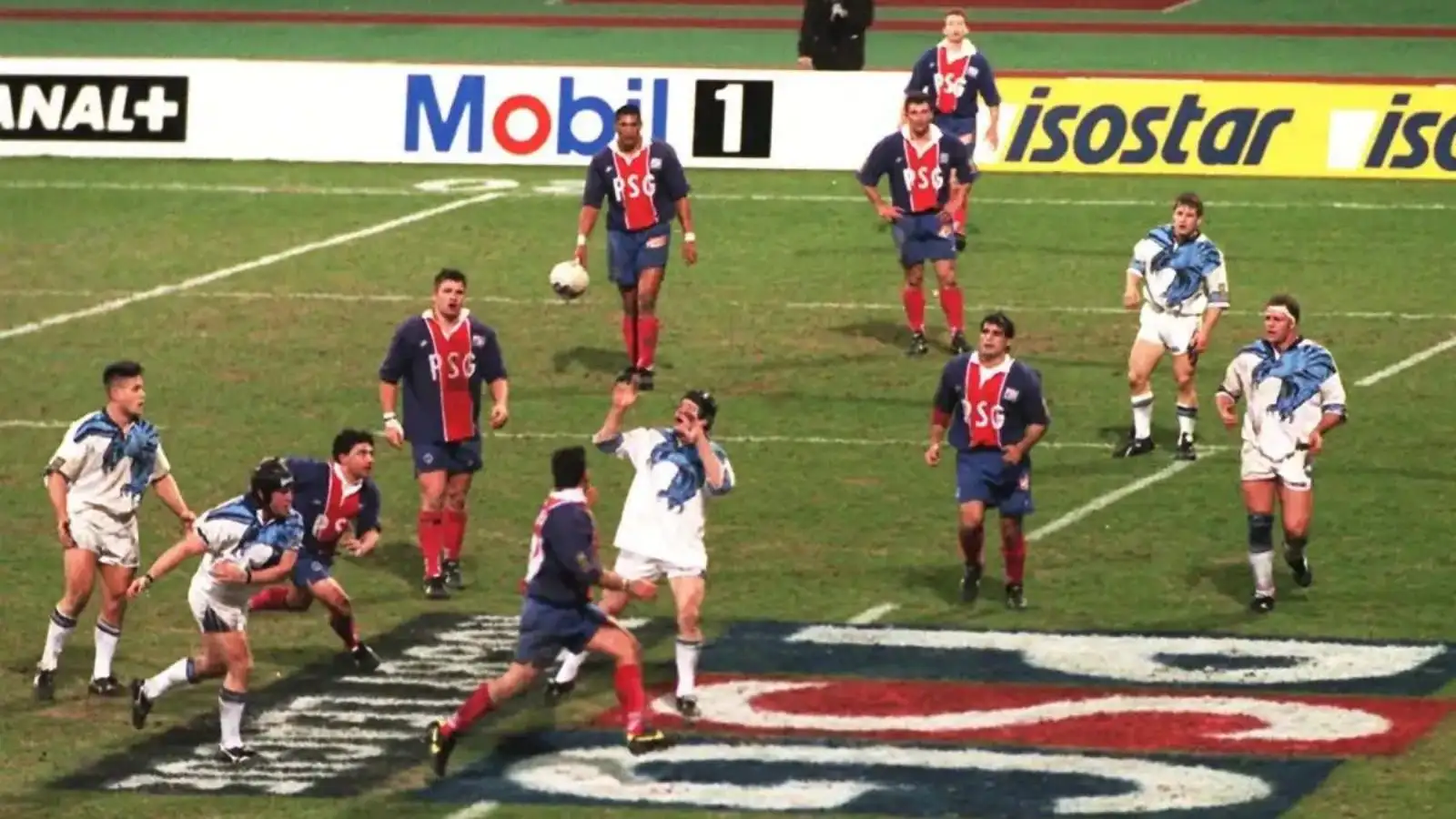Remembering when Paris Saint-Germain had a rugby league team

An action shot from Paris Saint-Germain v Sheffield Eagles in March 1996, the first-ever Super League fixture
Before superstar striker Kylian Mbappé had even been born, Paris Saint-Germain’s rugby league team had already been and gone, with the question of what could have been still pertinent some 26 years on from its demise.
Multi-sports club PSG – who have since gone on to become giants of the footballing landscape – had already put their name against basketball, handball and volleyball teams when the idea of a rugby league team was brought about in 1995.
48 hours prior to Christmas Day in December of that year, ‘Paris Saint-Germain rugby league‘ were made an official outfit.
Bringing with them a three-year broadcasting deal with Canal+, who acted as a parent company to the PSG brand, the French side appointed founder Jacques Fouroux as their president, Australian Tas Baitieri as manager and Michel Mazaré as head coach.
Paris Saint-Germain’s rugby league team: The vision
As we still see today, more so now with the dawn of the new IMG era, Paris’ product was about more than what they were able to offer on-field.
The club – playing at the 20,000-capacity Stade Sébastien-Charléty in the south of France’s capital city – handed most of their home tickets out for free, largely to sponsors of the club who then gave them to customers.

Pre-match shows with musical acts and firework displays were put on, and in the very first Super League game ever played, they got off the the perfect start – beating Sheffield Eagles 30-24 in front of 17,873 on March 29, 1996.
No club that played in Super League in 2023 had a higher average attendance than that tally across the campaign!
Paris Saint-Germain’s rugby league team: Scraping survival in ’96
PSG’s positive start continued, losing just one of their first four with two wins and a draw all coming on home soil.
But that start wasn’t able to be built upon, and after those first four games, just one more win would come throughout the entire 1996 season, also at home – against London. Not a single point was picked up on the road.
Fouroux and Baitieri both left the club midway through the season, with financial problems already arising as well as logistical holes emerging.
Paris survived by the skin of their teeth, with Workington Town – one of the three opponents they managed to beat – relegated. The Cumbrians won only two games all year, ending on five points, two worse off than PSG.
Paris Saint-Germain’s rugby league team: The beginning of the end in ’97
Finances proved PSG’s achilles’ heel in the end, with a huge issue right from the off being that the ‘Paris Saint-Germain’ tagline was realistically an affiliation rather than something which provided security. The multi-sports club did not actually own the rugby league team so the cash on offer was essentially the minimum.

Nonetheless, ahead of the 1997 season, the side went full-time. The late Peter Mulholland took charge, later to be replaced by Andy Goodway.
Having competed in the Challenge Cup at the start of the year, winning away against Batley Bulldogs before being knocked out by Salford, PSG’s start to the Super League campaign was a good one.
Again, in Round 1, they beat Sheffield. This time, an 18-4 win came in the Steel City, with the French side picking up a first-ever away win in the league.
More wins eventually followed – including one against Australian outfit Western Reds in a revamped World Club Challenge series – and an 11th-place finish was achieved for the second year running in Super League.
Off-field matters had dominated the year for PSG though, stripped of the tagline for a brief spell in the middle of the season by the multi-sports club, separately becoming embroiled in a tax avoidance scandal.
’97 was rounded off with a heavy defeat to Salford in the end-of-season Premiership tournament and sadly, just under two months later, the team would be no more. That would prove their last-ever game.
Paris Saint-Germain’s rugby league team: October 19, 1995 – November 3, 1997
With finances cut and the RFL’s subsidisation brought to an end, PSG had little choice other than to disband, which is exactly what they did. The official date at which they became ‘defunct’ was November 3, 1997.
Deemed unprofitable, the side lasted just 52 games – winning 11, drawing one (against Oldham) and losing 40.

It’s worth noting that attendances dramatically dropped off at their home fixtures too, with a defeat to Salford in Round 15 of the 1997 season seeing just 500 spectators make the trip to the Stade Sébastien-Charléty. That – to this day – remains an all-time low in Super League.
Deon Bird ended up the team’s top appearance-maker with 37, but Phil Bergman – in 29 appearances – grabbed 16 tries, pipping Bird (15) to the top try-scorer accolade.
Elsewhere, Australian dual-code ace Matt O’Connor’s 32 goals give him PSG’s highest conversion tally, and he is also their highest overall points scorer with 70, just ahead of Bird on 64.
PSG – to some extent – laid the path for Catalans Dragons‘ success in the British game, with the Dragons beginning their Super League adventure back in 2006 and now being established as one of the best side’s in the top flight.
Men’s boxing is the only other facet that the PSG brand has been involved in that is now defunct. As well as football – both men’s and women’s, the club is now associated with handball, judo and e-sports teams amongst others.
We do wonder how Mbappé would have coped in rugby league… it’s a shame we’ll never know!